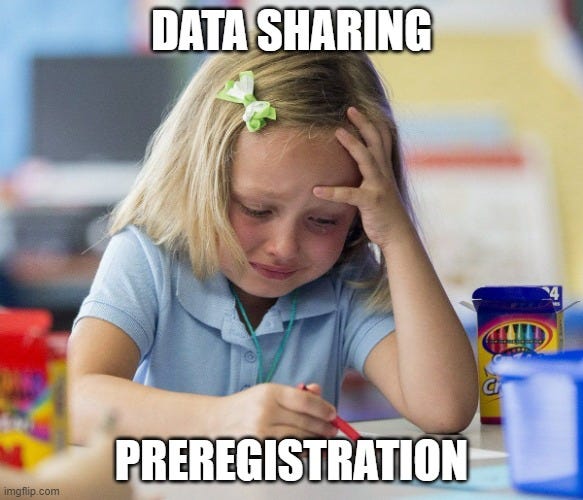Open Science and Overwork
Comments on Hostler (2023)
Tom Hostler has just published an article titled “The invisible workload of open research” in the Journal of Trial and Error’s special issue on the “Consequences of the scientific reform movement: Is the scientific reform movement headed in the right direction?” It’s an insightful and thought-provoking piece that uncovers the potential workload costs of open research, considers why these costs may be ignored by university management, and makes some useful recommendations for moving forward. Here’s a few quotes to whet your appetite.
The Problem
The benefits of open research practices have been widely discussed (Munafò et al., 2017), and generally speaking researchers have positive attitudes towards adopting open research practices, finding them worthwhile (Eynden et al., 2016; Lowndes et al., 2017), and recommending their use to others (Sarafoglou et al., 2022). However, high time cost is repeatedly identified as one of the main barriers to the adoption of open practices (Eynden et al., 2016; Gownaris et al., 2022; Tenopir et al., 2011) and time is the main thing that researchers lack, with workloads at capacity across the sector, having already reached “untenable” levels (Long et al., 2020; Papadopoulos, 2017).
In short, implementing open science reforms take work, and work takes time, which academics have very little of!
University Management are Not Motivated to Help!
The theory of academic capitalism suggests that the responsibility for addressing potential discrepancies between modelled and actual workload will not be taken up voluntarily by university management, who may at best ignore such issues, or at worse tacitly approve of them as a form of capitalist efficiency (Lyons & Ingersoll, 2010). In other words, if university management can choose not to incorporate open research into workload models, then they won’t.
I don’t think many working academics need to refer to the theory of academic capitalism to appreciate this point! But to quell any doubt, Hostler refers to empirical work by Kenny and Fluck (2022) and Miller (2019). For example, Kenny and Fluck (2022) found that:
Management knows that academics will do research (and other work) in their own time and exploit that….What is written on paper in terms of hours re admin or research does not correspond to the actual time spent. It all looks fine on paper but has enormous hidden workloads.
Hence, Hostler concludes:
There is a high potential for expectations to engage in open research to become widespread, but without additional time on academics’ workloads dedicated to the activity.
Some Open Research Advocates Do Not Acknowledge Open Research Workload
Suggestions that concerns about the workload of open research are an example of a “myth” (Bastiaansen, 2019) or a “misconception” that can be corrected by “positive advocacy” (Hagger, 2022) are unhelpful to having honest conversations about the practical negative consequences of conducting open research.
This is an important point. Some open science advocates engage in a pretty hard sell, and this can include omitting or downplaying some of the costs of open science. However, like Hostler says, it’s worth having “honest conversations” about the pros and cons of open science in order to set more realistic expectations.
A Key Recommendation
I’ve just picked out one of Hostler’s recommendations below to keep things brief, but note that he makes several more in his article:
When promoting open research reforms in universities or conducting open practices themselves [open research advocates] should advocate not only for investments in open research infrastructure and training but to receive extra time in workload allocations to acknowledge the additional burden of open research.
Getting open research work acknowledged in university workload models is likely to be easier said than done! As Hostler explains, open research work often consists of many small tasks, rather than a few large tasks, and so it’s easily overlooked in workload models. Nonetheless, cumulatively, open research workload can be substantial and, as Hostler notes, if it’s ignored, we risk “death by a thousand 10-minute tasks” (Bozeman et al., 2021).
The Article
Hostler, T. J. (2023). The invisible workload of open research. Journal of Trial & Error. https://doi.org/10.36850/mr5





What is the extent that "Open Science" in Hostler's argument can be replaced with "quality"? In other words, management are motivated to under-recognise *all* work which goes into doing high quality research (because academics have non-institutional motivations for making work higher quality). To the extent that Open Research practices are adopted as aspects of higher quality (rather than being required institutionally as arbitrary add-ons), they will just be another example in a much larger general category of academic labour which is underrecognised but contributes to research quality (along with thorough literature reviewing, mentoring, citing properly, reviewing, etc )
If this is the case, the bonus is that efforts to ameliorate underrecognition / work-loads might cover adoption of open research practices without need for special consideration